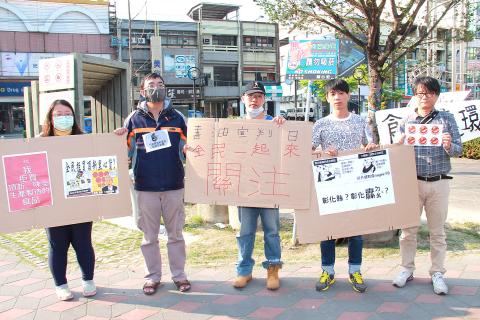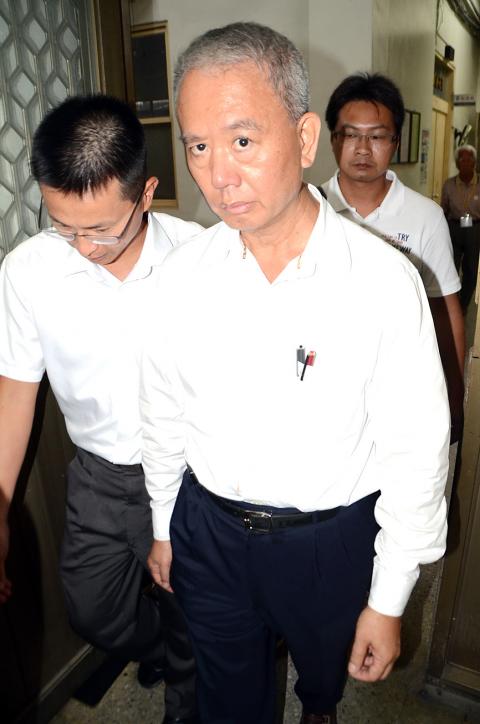Defendants in an adulterated cooking oil case that shook the nation last year, including former Ting Hsin International Group (頂新集團) executive Wei Ying-chun (魏應充), were found not guilty of breaching the Act Governing Food Safety and Sanitation (食品安全衛生管理法) by the Changhua District Court yesterday.
The Changhua County Prosecutors’ Office in October last year charged former Ting Hsin Oil and Fat Industrial Co (頂新製油實業) chairman Wei over violations of the act after investigators found the company had imported animal feed-grade material from Vietnam-based oil manufacturer Dai Hanh Phuc Co (大幸福) and declared it to customs as fit for human consumption. It was then used to make oil for cooking and making pastry.
At the time, prosecutors asked for a 30-year prison sentence for Wei, while asking for 18 years each for 59-year-old former Ting Hsin Oil and Fat general manager Chang Mei-feng (常梅峰), 43-year-old former acting president Chen Mao-chia (陳茂嘉) and 56-year-old Yang Chen-yi (楊振益), the owner of Dai Hanh Phuc.

Photo: Chen Kuan-pei, Taipei Times
The prosecutors also recommended the confiscation of allegedly illegal profits Ting Hsin International Group made from the oil products, totaling NT$440 million (US$13.4 million).
Yesterday’s ruling said prosecutors failed to prove that Ting Hsin Oil and Fat sourced fat extracted from unhealthy animals or that the company’s products were manufactured using unsanitary processes.
The defendants could not be proved to have committed the crimes they were charged with and are therefore not guilty, it said.

Photo: Yen Hung-chun, Taipei Times
The case can be appealed.
Wei resigned as chairman of Ting Hsin Oil and Fat, Cheng I Food Co (正義股份) and Wei Chuan Foods Corp (味全食品工業) — all companies controlled by the family-run Ting Hsin International Group — after the firms were found to be producing questionable oil products.
In a statement released after the ruling, the group said it respects the court’s decision and would accept all criticism from society, adding it would seek to give back to Taiwan, which it considers its home, as much as possible.
Netizens and civic groups reacted angrily to the ruling.
Saying the verdicts were vastly different from what the public expected, many netizens said that the nation’s judiciary was dead.
One netizen sarcastically said that he was glad to hear the ruling because it meant the oil he consumed over the past decade was safe and that he had not consumed tainted oil products for a decade or more.
Homemakers United Foundation secretary-general Lai Hsiao-fen (賴曉芬) called on consumers to boycott Ting Hsin’s products in light of the ruling, adding that consumers should use their autonomy and make corporations pay a price for malfeasance.
Former Taipei District Prosecutors’ Office head prosecutor Hu Yuan-lung (胡原龍), who had been involved in the investigation of the case, said the discrepancy between public expectations and the ruling was due to the hastiness of the Changhua County Prosecutors’ Office.
The Changhua office investigated for only eight days before it indicted the defendants, Hu said, adding that the investigation could not find substantial evidence to back the allegations, which was the prime reason the collegiate benchruled the way it did
The Food and Drug Administration said it would cooperate with the Changhua office to provide evidence, vowing to appeal the ruling.
Linkou Chang Gung Memorial Hospital department of clinical toxicology director Yen Tsung-hai (顏宗海) said that cooking oils have few categories of inspection, most of which only search for total polar compounds and heavy metals, but there could be other harmful ingredients in oils.
National Taiwan University (NTU) toxicology professor Chiang Chih-kang (姜至剛) called on legal amendments to define items that can cause chronic toxicity, while NTU’s Food Safety Center executive officer Hsu Fu (許輔) said the government should grant food inspection controllers more power to prevent food safety incidents.
Additional reporting by Chen Ping-hung and Wu Liang-yi

Tropical Storm Gaemi strengthened into a typhoon at 2pm yesterday, and could make landfall in Yilan County tomorrow, the Central Weather Administration (CWA) said yesterday. The agency was scheduled to issue a sea warning at 11:30pm yesterday, and could issue a land warning later today. Gaemi was moving north-northwest at 4kph, carrying maximum sustained winds near its center of up to 118.8kph and gusts of 154.8kph. The circumference is forecast to reach eastern Taiwan tomorrow morning, with the center making landfall in Yilan County later that night before departing from the north coast, CWA weather forecaster Kuan Shin-ping (官欣平) said yesterday. Uncertainty remains and

SEA WARNING LIKELY: The storm, named Gaemi, could become a moderate typhoon on Wednesday or Thursday, with the Taipei City Government preparing for flooding A tropical depression east of the Philippines developed into a tropical storm named Gaemi at 2pm yesterday, and was moving toward eastern Taiwan, the Central Weather Administration (CWA) said. Gaemi could begin to affect Taiwan proper on Tuesday, lasting until Friday, and could develop into a moderate typhoon on Wednesday or Thursday, it said. A sea warning for Gaemi could be issued as early as Tuesday morning, it added. Gaemi, the third tropical storm in the Pacific Ocean this typhoon season, is projected to begin moving northwest today, and be closest to Taiwan on Wednesday or Thursday, the agency said. Today, there would likely

DISRUPTIONS: The high-speed rail is to operate as normal, while several airlines either canceled flights or announced early departures or late arrivals Schools and offices in 15 cities and counties are to be closed today due to Typhoon Gaemi, local governments announced last night. The 15 are: Taipei, New Taipei City, Taoyuan, Tainan, Keelung, Hsinchu and Kaohsiung, as well as Yilan, Hualien, Hsinchu, Miaoli, Chiayi, Pingtung, Penghu and Lienchiang counties. People should brace for torrential rainfall brought by the storm, with its center forecast to make landfall on the east coast between tonight and tomorrow morning, the Central Weather Administration (CWA) said. The agency issued a sea warning for the typhoon at 11:30pm on Monday, followed by a land warning at 11:30am yesterday. As of

CASUALTY: A 70-year-old woman was killed by a falling tree in Kaohsiung as the premier warned all government agencies to remain on high alert for the next 24 hours Schools and offices nationwide are to be closed for a second day today as Typhoon Gaemi crosses over the nation, bringing torrential rain and whipping winds. Gaemi was forecast to make landfall late last night. From Tuesday night, its outer band brought substantial rainfall and strong winds to the nation. As of 6:15pm last night, the typhoon’s center was 20km southeast of Hualien County, Central Weather Administration (CWA) data showed. It was moving at 19kph and had a radius of 250km. As of 3pm yesterday, one woman had died, while 58 people were injured, the Central Emergency Operation Center said. The 70-year-old